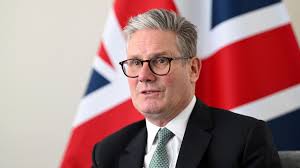Global Shockwave: UK, Australia & Canada Recognize Palestinian State

In a momentous diplomatic shift, the United Kingdom, under the leadership of Sir Keir Starmer, has formally announced its recognition of a Palestinian state. This decision, conveyed in a video statement by the UK Prime Minister and confirmed in a letter to Palestinian Authority President Mahmoud Abbas, marks a significant departure from decades of Western foreign policy. Sir Keir articulated that this action is taken “in the face of the growing horror in the Middle East” to “keep alive the possibility of peace and a two-state solution,” emphasizing a “pledge to the Palestinian and Israeli people that there can be a better future.”
The UK's move places it alongside Australia and Canada, which also formally recognized the state of Palestine on the same day. Portugal is expected to follow suit, with France and other nations anticipated to make similar announcements, potentially at the annual UN General Assembly. This collective action signifies a “seismic shift” from the long-held Western position that Palestinian statehood should only emerge as part of a negotiated peace deal with Israel. Britain and Canada notably became the first G7 countries to take this step.
The decision has ignited fierce criticism, particularly from the Israeli government. Prime Minister Benjamin Netanyahu vehemently rejected the recognition, stating that a Palestinian state “will not happen” and calling it “a huge reward to terrorism.” Both the Israeli and US governments argue that such recognition serves as a diplomatic gift to Hamas following its attack on southern Israel on October 7, 2023, which resulted in 1,200 deaths and 251 hostages taken. Sir Keir, however, countered this assertion, insisting that the decision “is not a reward for Hamas” but rather aims to ensure Hamas has “no future, no role in government, no role in security,” characterizing the UK’s call for a genuine two-state solution as “the exact opposite of [Hamas’s] hateful vision.”
The UK Foreign Office clarified that it “recognises Palestinian statehood over provisional borders, based on 1967 lines with equal land swaps, to be finalised as part of future negotiations.” The two-state solution envisions the creation of a Palestinian state in the West Bank and Gaza Strip, with East Jerusalem as its capital, generally along the pre-1967 Arab-Israeli war lines. Palestinian Authority President Mahmoud Abbas welcomed the UK’s decision, believing it would help establish a path for “the state of Palestine to live side by side with the state of Israel in security, peace and good neighbourliness.” Palestinian foreign minister Varsen Aghabekian Shahin underscored that “Recognition is not symbolic,” sending “a very clear message to the Israelis on their illusions on continuing their occupation forever.”
This diplomatic shift comes amidst intense international pressure on Israel over its ongoing war in Gaza, which was triggered by the Hamas attack. The conflict has led to vast destruction, a spiralling death toll (at least 65,208 people, mostly civilians, according to the Gazan health ministry), and a severe humanitarian crisis with widespread lack of food. Sir Keir condemned the “starvation and devastation [in Gaza]” as “utterly intolerable” and the “death and destruction” as horrifying. Public pressure in the UK has also mounted, with thousands rallying monthly in support of Palestinian statehood; a recent poll showed two-thirds of young Britons aged 18-25 backed the idea.
Historically, Britain holds a unique position, having played a pivotal role in laying the groundwork for Israel’s creation through the 1917 Balfour Declaration. Deputy Prime Minister David Lammy acknowledged in July that “Britain bears a special burden of responsibility to support the two-state solution.” Three-quarters of UN members, over 140 of 193, already recognize Palestinian statehood. Starmer had previously indicated in July that his Labour government intended to recognize a Palestinian State unless Israel took “substantive” steps, including a ceasefire in Gaza, increased aid, and a commitment not to annex the West Bank. He continues to call for the release of remaining hostages and is expected to set out new sanctions on Palestinian militants. Lammy noted that while recognition offers hope, it alone will not directly feed children or free hostages, emphasizing the continued need for humanitarian aid and a ceasefire.
You may also like...
Genetic Engineering: Ethical Innovation or Pandora’s Box?

"Genetic engineering promises cures, better crops, and scientific breakthroughs—but is humanity ready for the ethical di...
UCL Explodes: Brawl and Red Card Rock Controversial Monaco vs Man City Thriller!

A dramatic Champions League match saw Manchester City draw against Monaco due to a controversial late penalty. Erling Ha...
PSG Stuns Barcelona, Ending Undefeated Run with Ramos' Late Strike!
)
Paris Saint-Germain triumphed over Barcelona with a 2-1 victory at the Olympic Stadium, sealed by a late Goncalo Ramos g...
Sean Astin Leads SAG-AFTRA's Fierce Stance on AI, Vows Fight for Fair Compensation

The emergence of AI performer Tilly Norwood has intensified the debate on technology's role in Hollywood, leading SAG-AF...
Quentin Tarantino's Legendary 'Kill Bill: The Whole Bloody Affair' Hits Theaters for the First Time Ever!

Quentin Tarantino's complete vision, "Kill Bill: The Whole Bloody Affair," will finally receive its first nationwide the...
Trump Adviser's ICE Threat at Bad Bunny's Super Bowl Performance Draws Jay-Z's Fierce Defense

Bad Bunny's selection as the 2026 Super Bowl Halftime Show headliner has sparked political controversy, with a Trump adm...
Hollywood Split Scandal: Nicole Kidman Reportedly 'Blindsided' by Keith Urban's New Romance

Actress Nicole Kidman is reportedly "blindsided" by her sudden divorce from country singer Keith Urban after 19 years of...
Shocking Confession: Robbie Williams Reveals Decades-Long Secret Battle with Tourette's

Robbie Williams has bravely opened up about his mental health, revealing his experience with “inside Tourette’s” and his...



